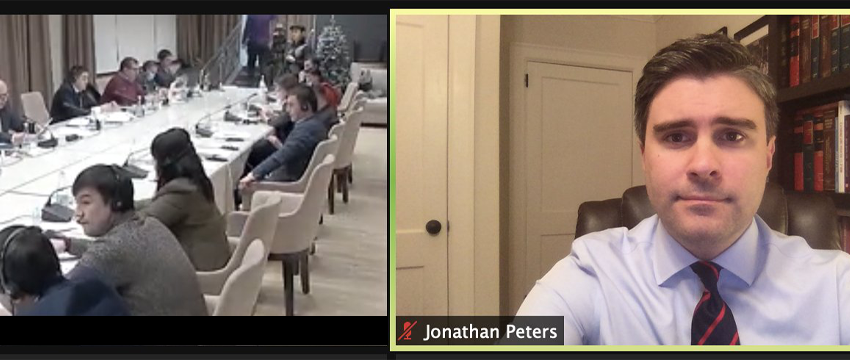Jonathan Peters presents on media freedom to court officials and journalists in Uzbekistan

Jonathan Peters presents on media freedom to court officials and journalists in Uzbekistan
Jonathan Peters, an associate professor of journalism who holds a secondary faculty appointment in the School of Law, regularly provides counsel and commentary on First Amendment issues in America. His expertise on the subject has made him a sought-after scholar around the world.
On December 3, 2020, Peters delivered two presentations to Uzbekistani journalists and court officials, including members of the Supreme Court of the Republic of Uzbekistan, about rights of access to United States courts and how U.S. journalists cover legal issues.
Peters was invited by the United Nations Development Programme (UNDP) because of his related work in the United States. His presentations were part of a larger project called the “Rule of Law Partnership in Uzbekistan,” whose purpose is to strengthen public access to the nation’s judiciary as well as public trust in it. The project is supported by the United States Agency for International Development (USAID).
“I was excited to be part of the event, and I was grateful for the chance to work with UNDP and USAID,” said Peters. “Their officials were helpful and supportive, and it was so interesting to learn from them about Uzbekistan—and to contribute to their efforts to strengthen public trust in the judicial system there.”
His primary message was consistent with a lesson he tries to impart to all of his UGA students: that journalism and law must make constant collaboration a priority to coexist productively and in service of democracy.
“There has to be a regular effort to reach across the differences in habit and philosophy that separate journalism and law,” Peters said. “This is really important because each profession can be so absorbed in its own ends that it can lose sight of the other.”
After his presentations, Peters fielded questions from the Uzbekistani participants, allowing judges and journalists alike to gain insight into American media and legal processes. The journalists, for example, asked about how best to explain the law’s complexities. The court officials, meanwhile, asked about media credentialing and whether U.S. judges are able to comment publicly on their rulings.
Uzbekistan is experiencing what Peters describes as “significant democratic change,” and his conversations with the court officials and journalists there made even clearer to him the strong relationship between open courts and a well-functioning democracy.
“That relationship is essential to the goals of political accountability and knowledge discovery and to the achievement of a dynamic civil society,” said Peters. “The rule of law is preserved partly by public knowledge of court rulings and activities.”
Peters encouraged judicial transparency and media access to courts, because news coverage of trials and the law can provide a critical service for citizens both factually and emotionally.
“The U.S. Supreme Court has emphasized repeatedly the historical importance of public trials and has reasoned that openness improves the functioning of a trial and has therapeutic value,” Peters said. “As the Court once put it, public trials provide ‘an outlet for community concern, hostility and emotion,’ and they educate and enhance public acceptance that justice is being done.”
The seminar with Uzbekistani officials and journalists is the latest international consultation for Peters. He is a regular participant in the U.S. Department of State’s Edward R. Murrow Program, through which he has trained journalists from dozens of countries in media-freedom principles. He has also consulted for European intergovernmental organizations on press rights at protests, and last year he completed a research project to inform the drafting of a United Nations Human Rights Committee document interpreting the right of peaceful assembly.